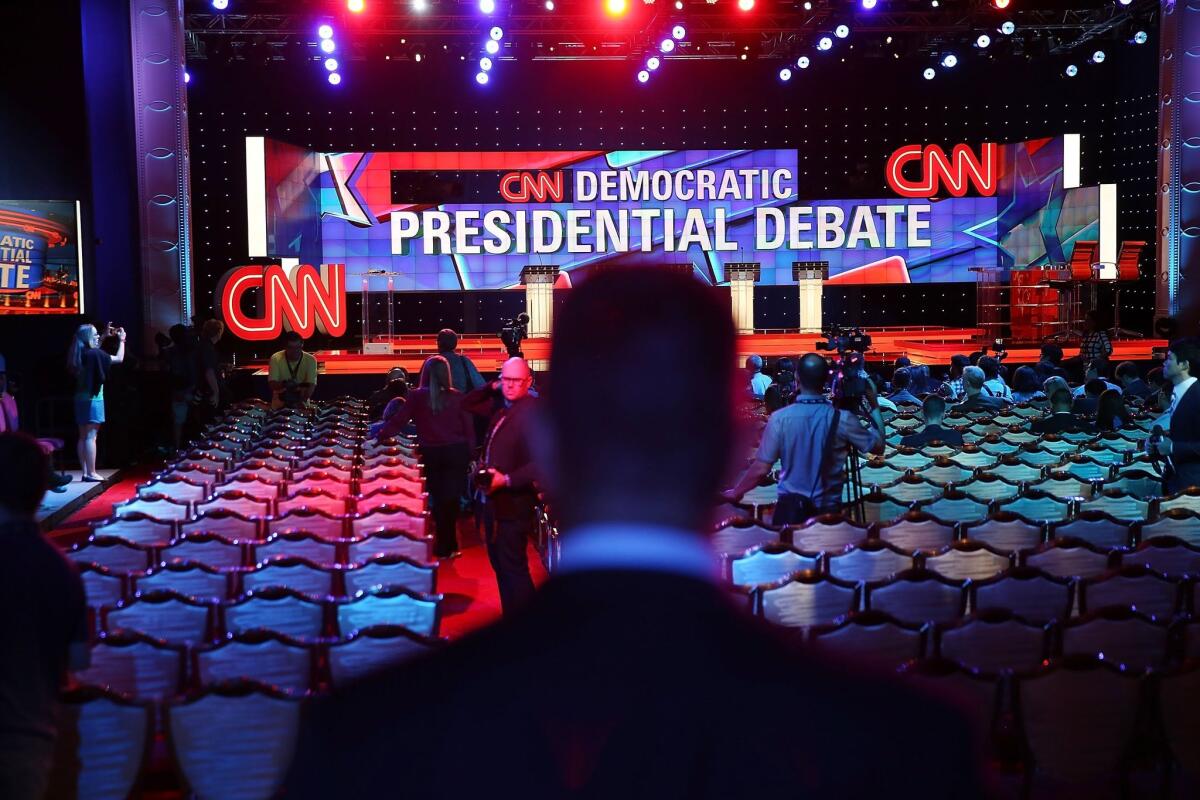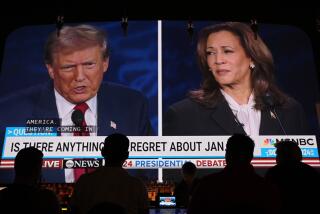Six take-aways from the Democratic debate

The stage is set for the first Democratic presidential debate at the Wynn Las Vegas.
- Share via
Far from the reality-show slug-fest of the crowded Republican debates, the Democrats’ first presidential match-up offered a textbook example of what a candidates forum can do: provide a clear-eyed discussion of thorny issues and produce winners and losers.
Here are six take-aways from the first debate:
Did Clinton win over skeptics?
For those who have doubted the staying power of Hillary Rodham Clinton, her performance reminded voters why she remains the party’s front-runner and the most experienced candidate.
Clinton seemed to soften her rough edges while firming up the shifting positions that have left her sounding more like a poll-tested candidate than a seasoned pro with strong convictions.
“I’m a progressive,” she said. “But I’m a progressive who likes to get things done.”
Over and over again, she batted back rivals’ attacks on her changes of position, her vote in support of the Iraq war, her private email server as secretary of State.
Former Maryland Gov. Martin O’Malley tried to make inroads before she finally quipped that she had been “very pleased” to have his support for president when she ran eight years ago.
Vermont Sen. Bernie Sanders, who declined to directly return fire at Clinton, served up perhaps most memorable line -- and assist -- of the evening:
“The American people are sick and tired of hearing about your damn emails,” he said. “Enough.”
Her campaign could not agree more.
Sanders shows why his supporters ‘Feel the Bern’
Gruff, rumpled and plainspoken, Sanders showed why his campaign has become the biggest challenge to Clinton’s candidacy at a time when voters crave authenticity and outsiders.
The senator may not ultimately win the party nomination with his calls for a “political revolution” and his description of himself as a democratic socialist.
But, as Sanders draws millions of small-dollar donations and boasts of the hundreds of viewing parties being held across the nation, he gave perhaps the strongest rationale for his candidacy.
“Republicans win when there is low voter turnout,” he said. “We are bringing out huge turnouts, and generating excitement all over this country.”
It’s (still) the economy, stupid
It was fitting that a casino in Las Vegas, a boom-and-bust city that has suffered like few others during the recession, offered the stage for a robust economic discussion.
Pocketbook issues remain tops on voters’ minds, and the candidates embraced a populist agenda of minimum wage, paid family leave and Wall Street regulations that at times drifted into the makings of a college-level seminar.
Sanders, for example, suggested he is not a “casino capitalist,” and O’Malley took his own swipe at the casino-style gambling of the big banks saved by the government bailout.
There was even a cameo by the Depression-era Glass-Steagall banking law -- perhaps a nod to the populist power of Wall Street warrior Sen. Elizabeth Warren (D-Mass.), who took a pass on running despite entreaties for her to jump into the primary race.
Clinton tried to walk a careful line: “It is our job to rein in the excesses of capitalism so it doesn’t run amok.”
SIGN UP for the free Essential Politics newsletter >>
Rebuilding the Obama coalition
From a shout-out to the importance of “Black Lives Matter” to an expansive push for immigration reforms, the Democrats tried to capitalize on the problems Donald Trump has created for the GOP with his harsh rhetoric toward immigrants and others.
It remains to be seen whether the Democrats can rebuild President Obama’s winning coalition of white and minority voters. But they are trying.
Perhaps most notable was the overt courtship of Latino voters, a voting bloc that, if big numbers turn out, can sway elections in some key states, including Nevada.
Both Clinton and O’Malley promised to “go further” than Obama’s immigration executive actions -- a sea change from just four years ago when immigration languished as an issue.
The also-rans solidify their status as also-rans
The debate had long been billed as a match-up between Clinton and Sanders, and the three other candidates solidified their standing as the other three.
O’Malley appeared unable to ignite and engage in a way that could boost his dismal poll numbers, despite a resume as a former mayor and governor, or his repeated attempts to one-up Clinton.
Former Sens. Jim Webb and Lincoln Chafee seemed to be struggling to keep up with the conversation.
“Anderson, can I get into this discussion at some point?” Webb asked of moderator Anderson Cooper.
Chafee, the Republican-turned-independent-turned-Democrat, boasted in his opening that one of his best qualifications, after serving as mayor, senator and governor, was that “I have had no scandals.”
The smallness of their campaigns accrued to Clinton.
Biden continues to hover
Even without Joe Biden onstage, the potential that the vice president will jump in the race remains a wild card.
Biden made a cameo during Obama’s recorded introduction with gauzy nostalgia for an era not quite yet done.
But as he watched from home at the Naval Observatory, it might have been that Biden’s moment to join the stage had passed.
For the latest from Congress and 2016 campaign follow @LisaMascaro
For more, go to www.latimes.com/politics
More to Read
Get the L.A. Times Politics newsletter
Deeply reported insights into legislation, politics and policy from Sacramento, Washington and beyond. In your inbox three times per week.
You may occasionally receive promotional content from the Los Angeles Times.











